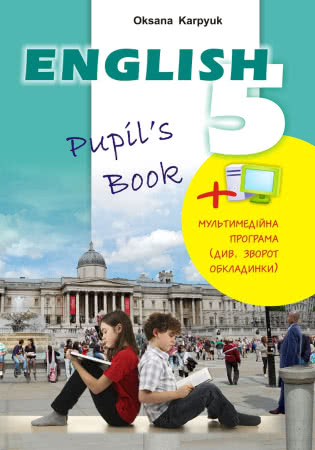
ГДЗ Англійська мова 5 клас Карпюк О.Д. 2018 рік (Нова програма)
ГДЗ Англійська мова 5 клас
Unit 5. Lesson 2. Discover the UK
Ех. З, p. 203
1. F.
2. A.
3. D.
4. C.
5. G.
6. B.
7. E.
Ех. б, p. 205
1. Windsor.
2. Castle.
3. Visit museums and cafes.
4. London.
5. Places of interest.
6. A lot of pictures.
7. Many souvenirs.
Ex. 1, p. 206
To see — have seen. To be — have been. To take — have taken. To visit — have visited. To come have come. To play — have played. To do — have done. To make — have made. To listen — have listened. To open — have opened. To meet — have met. To buy — have bought. To read — have read.
Ex. 2, p. 206
1. Ann hasn’t watered the flowers yet.
2. Mum hasn’t gone to her work yet.
3. I haven’t seen this film yet.
4. We haven’t taken the bus yet.
5. Bob hasn’t entered the shop yet.
6. They haven’t read this book yet.
7. The children haven’t made a present for their mother yet.
Ex. 3 (b), p. 207
1. I haven’t seen this film yet.
2. I haven’t made an article yet.
3. I haven’t read this magazine yet.
4. I haven’t worked on a computer yet.
5. I haven’t gone to the forest yet.
6. I haven’t done this work yet.
7. I haven’t written in Japanese yet.
8. I have never seen this film before.
9. I have never made an article before.
10. I have never read this magazine before.
11. I have never worked on a computer before.
12. I have never gone to the forest before.
13. I have never done this work before.
14. I have never written in Japanese before.
15. I have already seen this film.
16. I have already made an article.
17. I have already read this magazine.
18. I have already worked on a computer.
19. I have already gone to the forest.
20. I have already done this work.
21. I have already written in Japanese.
22. I have just seen this film.
23. I have just made an article.
24. I have just read this magazine.
25. I have just worked on a computer.
26. I have just gone to the forest.
27. I have just done this work.
28. I have just written in Japanese.
Ex. 4, p. 207
1. Have you read the book?
2. Has she written the exercise?
3. Has mum made a cake?
4. Have you seen a real elephant?
5. Have they taken all the chairs?
6. Have Mile and I done Maths for today?
7. Has a happy smile appeared on his face?
Ex. 2, p. 214
1. Great Britain.
2. Englishmen have a sentimental love for things and traditions because they are old.
3. Since the twelfth century.
4. From the time when there were a lot of robbers in London.
5. Who goes home?
6. Of traditions.
Ex. 4, р. 215
1. I have learnt that if you look at the Earth from the space you will see it is a round ball with a land. seas, oceans, continents and even countries.
2. I have understood that all the countries have interesting people, places, animals and plants.
3. I have thought that people speak one language but now I know that they speak different languages.
4. I have learnt that each country has its national flag, anthem and its own traditions and customs.
5. I have understood that this information came to us due to the curious and brave people who travelled and explored the world around them.